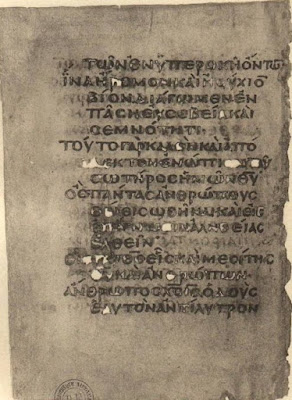 |
| Page from Codex H (015) at 1 Tim 2.2-6 (6th Century) |
I recently read an older article in the academic journal Vigiliae Christianae that argues for Polycarp's belief that 1 and 2 Timothy were written by Paul.
Kenneth Berding, "Polycarp of Smyrna's View of the Authorship of 1 and 2 Timothy," Vigiliae Christianae 53.4 (Nov., 1999): 349-360.
Here is the conclusion of the article as a summary.
"This paper has sought to demonstrate that there is a marked tendency in Polycarp's letter to the Philippians to cluster Pauline citations and allusions in the three passages in which he mentions the name of Paul. This indicates that Polycarp (consciously or unconsciously) considered the references to be Pauline. In addition, the first cluster contains a phrase from 1 Tim 6:10 followed by one from 1 Tim 6:7. The second cluster contains a phrase from 2 Tim 4:10. The most plausible conclusion which can be drawn is that Polycarp considered these also to be Pauline. If Harrison (and much of modern scholarship) is correct in linking Titus to 1 and 2 Timothy, Polycarp has become the earliest external witness to the belief in the early church that Paul was the author of the Pastoral Epistles." (pg 360).
I find the collective evidence presented as pretty persuasive. In support of this early attestation, it appears that Ignatius of Antioch, in his letter to the Ephesian church, may have had 1 and 2 Timothy in view when he made a passing reference to Paul.
"You are the highway of those who are being killed for God's sake; you are fellow initiates of Paul, who as sanctified, who was approved, who was deservedly blessed─may I be found in his footsteps when I reach God!─who in every letter remembers you in Christ Jesus." (Ign. Eph. 12.2)
Which letters may Ignatius be referring to here? Obviously, it is likely he is referring to the New Testament writing, Ephesians. However, this is only one letter, why does he mention "every letter" (πάση επιστολη), which seems to be referring to every letter in the Pauline corpus? Most commentators of Ignatius see this reference as hyperbole. Paul mentions the Ephesian Christians in only four of his letters, 1 Corinthians, Ephesians, and first and second Timothy (pg 163-164).
Perhaps another solution is that Ignatius is referring to letters that were written to the Ephesian Church directly. This would include of course Ephesians, but also 1 and 2 Timothy as well for Paul had left Timothy in Ephesus to minister and instruct the Christians in the city (1 Tim 1:3). Thus it might be that once Timothy received the letter, he read it out to the Church there. If this is what Ignatius is referring to (granted this is speculative) then Ignatius is attributing Pauline authorship to the letters of 1 and 2 Timothy.
______________________________________
Holmes, Michael W., ed. The Apostolic Fathers: Greek texts and English translations. Grand Rapids: Baker Books, 1999.

Great find. This makes the most sense since Paul everywhere took pains to be credible. The compositions, also, display propriety internally and would be null if found with a false author. Seems like they would have been exposed prior, if forgeries, rather than lack of mention with the "church epistles." I am mostly unaware of all the evidence against inclusion, having focused on different matters.
ReplyDelete"Ephesians" is most certainly the letter addressed to Laodicea and was commanded to be a circular epistle (Col. 4.16). The epistle to Laodicea is certainly not lost since Paul wanted the churches to compare these two letters (Colossians, Ephesians), seemingly, to compare their complimentary thoughts to derive insights. The circular Laodicean letter, presumably after copies were made, also made its way to Ephesus which probably had better preservation facilities. A later scribe, finding it there, added "to the Ephesians."
Thanks Alex. Yes, I agree that the letter of Ephesians is likely the letter Paul referred to as from Laodicea. Really, judging by Paul's comments in Colossians 4:16, many (most) of Paul's letters were circular letters and were meant to be that way (except for possibly 1&2Timothy)
DeletePerhaps also, since they were personal pastoral letters, they were not included in lists of Paul's letters to churches.
DeleteThanks Alex, good insights there. I think that you're right. Because the letters were personal and perhaps focused in on Timothy's ministry in Ephesus, it may be that those letters didn't circulate as widely as quickly.
Delete"why does he mention "every letter" (πάση επιστολη), which seems to be referring to every letter in the Pauline corpus?" Probably because the so-called letters of Ignatius (both long and short versions) are rather late, and a sizable Pauline corpus was known by the time they were fabricated.
ReplyDeleteThe same Pauline corpus was known at an early date as well, so this line of reasoning does not work
Delete